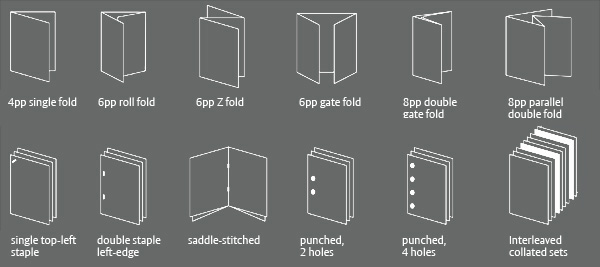Terminology
Binding
 Comb plastic comb binding used mainly for reports that need to lay flat. CPS have the capacity to handle large volumes of comb bound books. Turnaround from loose sheets to bound books can be very fast. An advantage that comb binding has over Wiro binding is that pages can be added after the initial binding by opening up the plastic comb. CPS offer white or black combs (which you specify) and a variety of diameters to match your document.
Comb plastic comb binding used mainly for reports that need to lay flat. CPS have the capacity to handle large volumes of comb bound books. Turnaround from loose sheets to bound books can be very fast. An advantage that comb binding has over Wiro binding is that pages can be added after the initial binding by opening up the plastic comb. CPS offer white or black combs (which you specify) and a variety of diameters to match your document.
 Perfect bound adhesive binding where individual sections are collected together and the spine is ground off (typically 3mm). Glue is then applied to the spine and a cover is drawn on before the product is trimmed to size. CPS perfect binding includes side gluing under the cover's hinges.
Perfect bound adhesive binding where individual sections are collected together and the spine is ground off (typically 3mm). Glue is then applied to the spine and a cover is drawn on before the product is trimmed to size. CPS perfect binding includes side gluing under the cover's hinges.
 Saddle stitch to fasten a booklet by wiring it (stapling) through the middle fold of the sheets.
Saddle stitch to fasten a booklet by wiring it (stapling) through the middle fold of the sheets.
 Square back an additional process after saddle stitching to help otherwise springy booklets to lie flat.
Square back an additional process after saddle stitching to help otherwise springy booklets to lie flat.
 Stab stitch stapling straight through the text block from the top. Can be single top-left or double left hand side.
Stab stitch stapling straight through the text block from the top. Can be single top-left or double left hand side.
 Wirodouble wire loops used mainly for reports that need to lay flat. We offer white or black combs (which you specify) and a variety of diameters to match your document. We offerstandard wiro, but can also producehalf Canadianwhich partially conceals the wire behind a square spine andtent card calendarswith tent cards bound into the wire.
Wirodouble wire loops used mainly for reports that need to lay flat. We offer white or black combs (which you specify) and a variety of diameters to match your document. We offerstandard wiro, but can also producehalf Canadianwhich partially conceals the wire behind a square spine andtent card calendarswith tent cards bound into the wire.
Finishing
Any process that follows the actual printing. Includes: folding, perforating, creasing, stitching, binding.
Folds
Any process that follows the actual printing. Includes: folding, perforating, creasing, stitching, binding. Below are some common folds.

GSM
Abbreviation for 'grams per square metre'. This indicates the weight of the stock. For example a CPS recycled photocopier paper is 75gsm, University letterhead is 120gsm, University postcards are 300gsm, text weight in University marketing brochures is 150gsm.
Perforate
Broken slotted cuts to enable the paper to be torn in the correct place. We can add this for mailer reply mechanisms.
Score
A machined crease in stock, so that folding will not damage it. We do this with all brochure covers before binding.
Standard paper sizes
| Size | Height x Width (mm) | Typical use |
|---|---|---|
| A0 | 1189 x 841 mm | Large posters |
| A1 | 841 x 594 mm | |
| A2 | 594 x 420 mm | |
| A3 | 420 x 297 mm | Posters, wall calendars |
| A4 | 297 x 210 mm | Brochures, stationery, reports |
| DL | 210 x 99 mm (also known as 1/3 A4) | Leaflets, comp slips, flyers |
| A5 | 210 x 148 mm | Leaflets, flyers, booklets |
| A6 | 148 x 105 mm | Postcards |
Stock
Paper, card or other material to be printed. The University uses two main stocks for printing: Revive Natural for University of Reading and Lumi Silk for Henley Business School.
- cps@reading.ac.uk
- 0118 378 8085
- Print Workshop location: TOB2, Earley Gate, Whiteknights (Building 21)
- Design Studio location: L027, London Road
